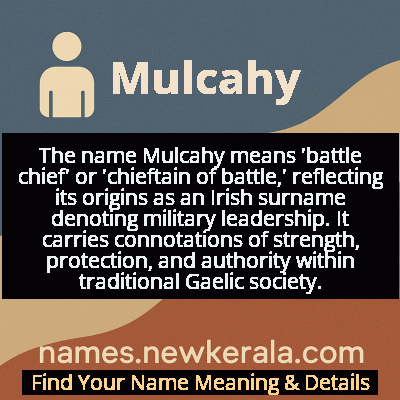Mulcahy Name Meaning & Details
Origin, Popularity, Numerology Analysis & Name Meaning of Mulcahy
Discover the origin, meaning, and cultural significance of the name MULCAHY. Delve into its historical roots and explore the lasting impact it has had on communities and traditions.
Name
Mulcahy
Gender
Male
Origin
Irish
Lucky Number
2
Meaning of the Name - Mulcahy
The name Mulcahy means 'battle chief' or 'chieftain of battle,' reflecting its origins as an Irish surname denoting military leadership. It carries connotations of strength, protection, and authority within traditional Gaelic society.
Mulcahy - Complete Numerology Analysis
Your Numerology Number
Based on Pythagorean Numerology System
Ruling Planet
Moon
Positive Nature
Diplomatic, friendly, artistic, empathetic.
Negative Traits
Over-sensitive, moody, indecisive, prone to self-pity.
Lucky Colours
Green, cream, white.
Lucky Days
Monday.
Lucky Stones
Pearl, moonstone.
Harmony Numbers
1, 3, 4.
Best Suited Professions
Diplomats, mediators, caregivers, artists.
What People Like About You
Cooperative spirit, friendliness, artistic talent.
Famous People Named Mulcahy
Dónal Cam Ó Súilleabháin Béara
Irish Chieftain
Led the famous march of O'Sullivan Bere during the Nine Years' War
Conchobhar Mac Conchobhair Ó Maolchatha
Gaelic Lord
Powerful ruler in Munster who maintained Irish sovereignty against English expansion
Risteárd Ó Maolchatha
Irish Revolutionary
Prominent figure in the Irish War of Independence and early Irish politics
Seán Ó Maolchatha
Gaelic Athletic Association Leader
Influential president of the GAA who helped preserve Irish cultural traditions
Name Variations & International Equivalents
Click on blue names to explore their detailed meanings. Gray names with will be available soon.
Cultural & Historical Significance
During the Norman invasion and subsequent English colonization, the Mulcahy clan maintained their Gaelic identity and often resisted foreign domination, contributing to their reputation as defenders of Irish culture and sovereignty. The name represents a direct link to Ireland's warrior aristocracy and the complex social structures of Gaelic Ireland before the Tudor conquest. In modern times, the name continues to symbolize Irish resilience and cultural pride, particularly in Munster where Mulcahy families have maintained continuous presence for centuries, participating in Ireland's political, cultural, and sporting life while preserving their distinctive heritage.
Extended Personality Analysis
Individuals bearing the Mulcahy name are often perceived as possessing natural leadership qualities, strategic thinking, and a strong sense of responsibility—traits that align with the name's meaning of 'battle chief.' They tend to be decisive and courageous when facing challenges, with an innate ability to assess situations and make quick judgments. Their leadership style often combines traditional values with practical wisdom, making them effective in both crisis management and long-term planning.
Mulcahys are typically seen as protective of their communities and families, displaying loyalty and commitment to those under their care. While they can be assertive and determined, this is usually balanced by a deep sense of honor and fairness. Their strength often manifests as quiet confidence rather than overt aggression, and they tend to earn respect through competence and integrity rather than demanding it. Many with this surname show resilience in adversity and a capacity to inspire others through example rather than rhetoric, embodying the enduring spirit of their Gaelic ancestors while adapting to contemporary challenges.
Modern Usage & Popularity
In contemporary times, Mulcahy remains predominantly a surname rather than a given name, though it occasionally appears as a first name in Irish-American families seeking to honor their heritage. The name maintains strong regional concentrations in its traditional homeland of Munster, particularly Cork and Limerick, while also being well-established in Irish diaspora communities in the United States, Canada, Australia, and Britain. While not among the most common Irish surnames, it retains cultural recognition and respect within Irish communities worldwide. In recent decades, there has been a modest revival of interest in traditional Irish names, which has helped maintain the Mulcahy name's visibility. The name continues to be associated with Irish cultural organizations, Gaelic sports, and historical societies, particularly those focused on preserving Munster's Gaelic heritage, ensuring its continued relevance in both Ireland and the global Irish diaspora.
Symbolic & Spiritual Meanings
Symbolically, Mulcahy represents leadership, protection, and cultural continuity. The 'battle chief' meaning extends beyond literal warfare to symbolize guardianship of community, tradition, and values. It embodies the archetype of the wise leader who combines strength with responsibility—someone who fights not for personal glory but for the welfare of their people. The name carries connotations of resilience and endurance, reflecting Ireland's long history of cultural survival against external pressures. In a metaphorical sense, Mulcahy symbolizes the bridge between ancient Gaelic traditions and modern Irish identity, representing the persistence of cultural memory and the transmission of heritage across generations. It also signifies the importance of principled leadership and the idea that true strength lies in serving and protecting one's community rather than dominating it, making it a powerful symbol of both personal integrity and collective identity.

